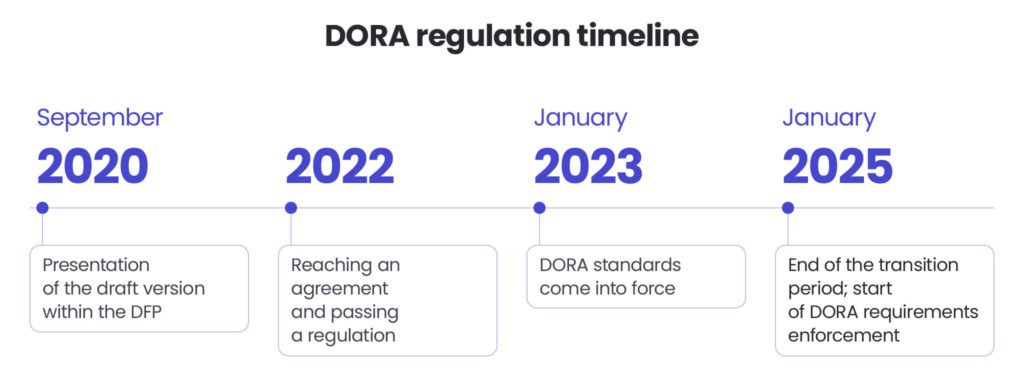Ensuring DORA compliance with comprehensive technology services
The financial sector’s increasing dependence on technology and digitisation means that institutions must be ready to address growing cyber threats. No wonder that ensuring operational resilience is becoming a top priority for both financial organisations and technology providers. The Digital Operational Resilience Act (DORA) is a regulatory framework that aims to strengthen the financial sector‘s ability to withstand and respond to ICT (Information and Communication Technology) disruptions. In this article, we explore the background and timeline of this regulation, its significance, the core requirements for DORA compliance, and how to establish such readiness for your company.
What is DORA?
DORA, or the Digital Operational Resilience Act, is a European Union regulation designed to boost the financial sector’s cybersecurity and operational stability. Introduced in September 2020 as part of the EU’s Digital Finance Package (DFP), it aims to create a unified framework for managing ICT risks across financial entities and their external partners and providers.
DORA establishes guidelines for the EU on ICT risk management, incident reporting, digital operational resilience testing, information sharing, and third-party risk management. The legislation was developed in response to the increasing frequency of cyber threats and operational disruptions, and it is part of a broader effort to strengthen financial stability and security in the EU’s digital financial ecosystem.
When does DORA come into effect?
After presenting the first version, holding consultations, and reaching the required agreements between the relevant EU authorities, DORA officially came into force on January 16, 2023, following its publication in the Official Journal of the EU. However, financial entities and ICT providers were given a two-year transition period to assess the current operational resilience framework and implement the necessary changes to meet the precise DORA requirements. The window ended on January 17, 2025, making DORA compliance now mandatory for all the affected financial institutions and their tech providers.

To whom does DORA apply?
DORA applies to various financial entities and their critical ICT service providers. Specifically, the regulation covers:
- Banks and credit institutions
- Insurance and reinsurance companies
- Investment firms
- Payment service providers and institutions
- Electronic money institutions (EMIs)
- Cryptocurrency service providers
Third-party ICT Service Providers (including cloud service providers, software vendors, and data centre operators)
All of these parties must implement a comprehensive ICT risk management framework, meet requirements to effectively manage any disruptions or threats, and confirm that their operations can continue with minimal interruption in the event of cyberattacks or system failures. By covering such a broad spectrum of financial organisations, DORA aims to ensure that all critical aspects of the EU financial sector’s digital operations are adequately protected.
DORA is valid in all EU countries, mandating a consistent approach to ICT risk management across the entire financial industry. It is worth mentioning that although the regulation only directly applies to entities operating in the EU, it also affects third-party ICT providers located outside the European Union that deliver services to EU-based financial institutions and businesses.
Why is DORA compliance relevant?
The importance of DORA cannot be underestimated, especially given the sector’s heavy reliance on digital solutions and the associated growing risks of cyber incidents, system failures, and dependence on third-party vendors. Financial institutions, due to their nature and access to critical and sensitive data, can be prime targets for cyberattacks. And any disruption in such systems can have serious economic and reputational consequences.
DORA is crucial for the following reasons:
- Enhanced cybersecurity: It mandates robust security measures to prevent and mitigate cyber threats, and ensure high levels of protection.
- Operational continuity: The framework helps guarantee that financial services and platforms remain available despite disruptions.
- Regulatory unification: It establishes a standardised approach across EU member states, reducing inconsistencies in risk management practices and regulatory fragmentation.
- Customer trust: It strengthens consumer confidence by confirming financial institutions are prepared for threats and resilient to cyber disruptions or potential leaks.
Discover financial services fully in line with DORA standards
Learn moreWhat are the DORA requirements?
The EU legislation outlines a few key measures designed to guarantee that financial entities can effectively manage ICT risks and recover rapidly from disruptions. These regulations include five essential requirements that must be met to assure DORA compliance:
ICT risk management:
- Develop and maintain robust ICT risk management frameworks.
- Implement risk identification, protection, detection, response, and recovery processes.
- Conduct regular risk assessments and audits.
Incident reporting:
- Establish clear procedures and protocols for timely detection, reporting, and managing ICT-related incidents.
- Report significant ICT incidents to regulatory authorities within specified timeframes and in a standardised manner.
Operational resilience testing:
- Conduct routine testing of ICT systems, including vulnerability assessments, penetration tests and scenario-based stress testing.
- Regularly engaging third-party service providers in resiliency testing and verifying the robustness of the security measures in place.
Third-party risk management:
- Ensure proper oversight and ongoing monitoring of critical ICT service providers.
- Conduct due diligence analysis and establish contractual agreements that outline service level expectations and address ICT risk management and resilience.
Information sharing:
- Encourage cooperation and information sharing among financial entities regarding cyber threats and security best practices.
- Cooperation between institutions helps detect and respond to threats more effectively, helping to protect the entire local financial sector.
Comprehensive technology services for DORA compliance
To achieve compliance with DORA, financial companies and agencies require a comprehensive approach that integrates tech services across various domains. As an experienced technology partner, we can facilitate your efforts to reach and maintain DORA compliance. We propose a comprehensive offer designed to help financial institutions do just that. Here are the services we can deliver to enable your organisation to meet digital operational resilience requirements:
Technology consultancy for DORA compliance
We offer evaluations and gap analyses to identify ICT system vulnerabilities using all relevant security frameworks and protocols. By focusing on providing expert consultations and the best strategies, we create tailored roadmaps for DORA compliance. Legacy systems are modernised to meet resilience standards, while custom risk management plans are crafted to address unique operational challenges.
Resilient systems development and implementation
To meet the operational resilience framework, our team designs systems that ensure business continuity and minimal disruption during failures or cyberattacks. We also build scalable, robust, fault-tolerant architectures and infrastructures using technologies such as .NET, Kubernetes and microservices. Deploying digital twin simulations and advanced monitoring tools allows us to proactively identify and address resiliency gaps and mitigate risk in real-time.
Cybersecurity and compliance solutions
We incorporate secure coding practices, thorough reviews, and testing routines throughout the development process, as well as implement zero-trust architectures, and conduct regular vulnerability assessments and penetration tests. More so, we ensure that data storage and encryption are optimised to guarantee compliance with DORA’s strict requirements for secure information handling.
Incident management and resilience strategy
Our services include developing response plans for errors or problems and platforms for real-time monitoring. We provide expertise regarding incident investigations and recovery, and conduct disaster recovery simulations to test and validate protocols for swift service restoration and regulatory compliance.
Cloud migration and optimisation
We ensure secure, compliant migration to cloud platforms with risk mitigation strategies. With multi-cloud resilience frameworks, we create failover and redundancy setups aligned with DORA’s standards. We help maintain operational security while optimising cloud costs.
AI and predictive analytics
By leveraging machine learning models to identify data patterns, we enhance fraud detection and system failure prediction. Implementing predictive analytics tools and monitoring dashboards allows us to provide actionable insights for proactive risk management and system supervision.
See how AI can impact your financial products and services>>
Training and regulatory awareness
To align your internal practices with DORA standards, we develop educational programs, deliver training modules, and conduct workshops on digital security, equipping your staff with the knowledge to sustain operational resilience strategies.
Continuous compliance support and advisory services
To provide real-time compliance status tracking and reporting, we offer the implementation of tools such as dynamic compliance dashboards. And our post-implementation support provides ongoing monitoring, system updates and consulting services to help you adapt to any future adjustments in DORA requirements.
Over to you
Ensuring DORA compliance requires a proactive and comprehensive approach to ICT risk management. Financial entities and their technology partners must invest in robust cybersecurity frameworks, operational resilience strategies, and regulatory alignment to avoid fines and enhance their defence against disruptions.
By leveraging comprehensive technology services, we help financial organisations get in line with DORA standards, meet all regulatory demands, and provide the cybersecurity and operational continuity that builds consumer confidence.
With the new guidelines already in effect, you should act now to assess your current capabilities and assure complete DORA compliance. If you need support adapting to the new requirements or are looking for financial solutions that fulfil them, don’t hesitate to contact us using the form below.
About the author





